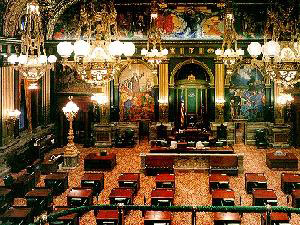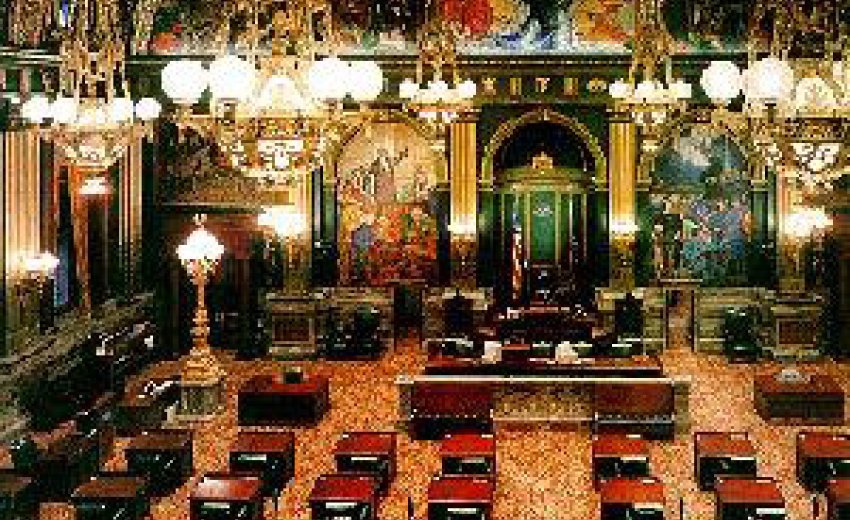 "Ek onkar satnam. There is but one God," began the prayer that opened the Pennsylvania Senate on Tuesday, as Nirmal Singh of Fairview Twp. became the first Sikh to perform that traditional duty.
"Ek onkar satnam. There is but one God," began the prayer that opened the Pennsylvania Senate on Tuesday, as Nirmal Singh of Fairview Twp. became the first Sikh to perform that traditional duty.
"Join me in the prayer. Ek On Kar, Sat Nam, There is but One God, True is His Name.
We pray, to the One God, Who created this universe, with all its colorful diversity, rang, as we call it.
We pray to the One God, under whose Divine Ordinance, Hukam, this Universe abides.
We pray to sabna jia ka ik data, the one God who provides for and sustains all this creation.
Pray, give us the understanding that this world is a dharamsal, an arena for righteous living – much of what people can accomplish in life, happens through their own Kal, their endeavor.
We pray for kirpa, thy divine mercy, to enable us all to be prayerful, to enable us all to provide for our families, enable us all to share with those in need, and enable us all not to shy away from doing what is right that truly is the righteous way.
Help us pray help us nurture a society, where we all live as a fraternity, with none feeling excluded or treated as a stranger Where we say some, and listen some, where we bring harmony peace, caring and sharing to our corporate, communal lives, and help each and every one of us, to grow, develop, and contribute towards a common good.
We pray for this sangat, this assembly, heavy is your responsibility and difficult are the choices you have to take as leaders of the people.
We pray for you individually and collectively to be blessed with the wisdom to conduct your business today and everyday in service of and for the well being of the citizens of this commonwealth.
We close this prayer as always seeking tere bhane sarbat ka bhala — that the well being of one and all in this world be thy will.
Waheguru Ji Ka Khalsa, Waheguru Ji Ki Fateh!" prayed Singh.
The Senate's tradition of opening with prayer drew a complaint from a watchdog group last year that the prayers often contain language only a Christian would use -- for example, "in Jesus' name."
Prayers in civic settings are constitutional only when they're nonsectarian, said Americans United for Separation of Church and State. Senate officials said they comply with the law by ensuring prayers come from a variety of faiths, not by monitoring prayers.
Sikhism is a monotheistic religion that developed in India during the 15th century. Singh's prayer included phrases from Sikh scripture.
"Sikh teachings are very universal, and I have tried to structure this prayer around its universality," he said in an e-mail. "My concern obviously was to try and offer an invocation that is universal in spirit and intent but can be traced back to its Sikh linkage."
Drew Crompton, counsel to Senate President Pro Tempore Joseph Scarnati, R-Jefferson County, said he's heard no more from Americans United since an exchange of letters late last year, but a spokesman for the group said the Senate's prayer policy still has a problem.
"We're glad that a handful of religious minorities" have been invited to the Senate, said spokesman Joe Conn, but "many of the prayers still have a sectarian slant."
In recent months, prayers have been given by Jews, a Unitarian, and a Buddhist.
Atheists have asked for an invitation. "I couldn't say fervently no," Crompton said. "But I don't know how atheists pray."
Steve Neubauer of Mount Wolf, president of Pennsylvania Nonbelievers, said he wrote an invocation that opened a York County Commissioners meeting three years ago.
Singh is a retired Indian Army colonel and business executive who has lived in the U.S. since 1987. He belongs to the Blue Mountain Gurdwara in Bethel Twp., Berks County.
-By MARY WARNER
Of The Patriot-News
[email protected]
